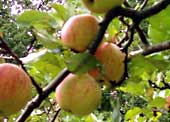Potassium
Potassium is an exception when compared to the other major nutrients. It is mainly stored in the intercellular spaces and thus ensures the osmotic suction power of the cell. Thus it is responsible for the water absorption and the evaporation protection of the plants.
Potassium contributes to the strengthening of the plant tissue and is therefore also responsible for stability and resistance to fungal and sucking pests. The fungi cannot penetrate into solid cell walls as quickly. Because, thanks to potassium, the content of soluble sugars in the cells also decreases, these are no longer so interesting for certain insects. All types of fruit, Potatoes, Carrots and beets benefit from a balanced potassium balance.
If there is a lack of potassium, the plant looks wilted, because the water intake is disturbed. The first signs of yellowing are the edges of the older leaves. These are known as chloroses. Later these places then die off. This is called necrosis. In addition to these obvious symptoms, there can also be a lack of stability, increased pest infestation and lower frost resistance.
There is too much potassium in the soil, then "burns" occur, the so-called salt damage. The leaves of the plants are often light green and irregular in shape. Usually there is also damage to the roots and the plant makes an overall unhealthy impression.
Anyone who buys potassium fertilizers from the trade, he should definitely pay attention to it, that he does not use a fertilizer with a high chloride content for chloride-sensitive plants. Potatoes, Wine, fruit, Soft fruit, Carrots, Cucumber, Onions, radish, Leeks and many ornamental plants take this pretty badly. It is better, if you use a chloride-free liquid fertilizer in these cases.
Before using the chemical fertilizer, But you should first check whether it is not just a "normal lack of water", that makes the plants look so limp. In that case, just pouring helps.
Recommended for all friends of organic fertilization:
- Wood ash
- Comfrey manure and bracken manure
- deposited manure (Chicken manure, Rabbit dung or horse manure from the local riding stables)
